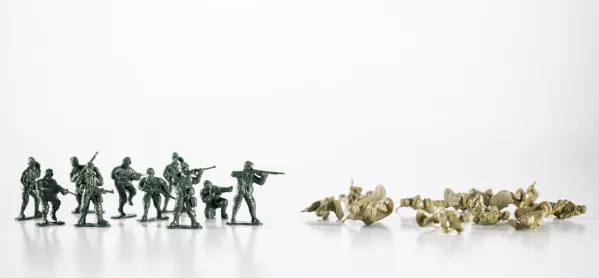“When I was told my contract would be honoured, I was delighted. Until they said I’d have to go into school.”
A fellow supply teacher was thrilled to land a long-term maths position, covering maternity leave at a local secondary school. She’d been without consistent work for a whole term, and the guarantee of employment up until the end of the academic year couldn’t have come at a better time for her.
Now she spends five days a week in a poorly ventilated ICT suite, helping key workers’ children access a variety of lockdown homework tasks, wearing a mask all day and on the opposite side of the school to that maths room she was looking forward to working in.
Joining her are several teaching assistants, as well as a lone permanent member of staff from a rota system that brings them on to the site once every three weeks. In another room, a cover supervisor helps another 20 or so children with their passcodes, keeping them entertained and challenged while putting on a brave face every day.
Coronavirus: The impact on supply teachers
“My husband says I’m being treated like cannon fodder,” the not-quite-yet-a-maths-teacher tells me. “But this is what the school needs me to do.”
I ask her if she feels exploited, and her answer is tactful. “I’d rather be teaching maths from home, like the rest of the department.”
The hesitation is understandable. Life as a supply teacher can feel like a curate’s egg at the best of times. Right now, being sent in to support alongside TAs during a pandemic, while the majority of payrolled staff work from home, might feel unfair. But, on the other hand, there’s little or no responsibility for supply teachers to deliver actual lessons while - and this can’t be stressed enough during these times - they’re being paid, albeit to babysit.
Furlough for supply staff is a complicated procedure, and entirely dependent on how much work they’ve been finding throughout an unstable 2020. The option of going into schools and providing aid for key workers’ children does at least provide financial stability. But at what cost to health?
Confusion about what’s safe
Most supply teachers I know genuinely want to help out and, if they don’t have homeschooling requirements themselves, why shouldn’t they? Yet there’s still lingering confusion about what’s safe.
As I write this, I’m looking through the Tes top-10 articles, and a piece on how teachers are twice as likely to catch Covid as other members of the population is trending two places above a report on how most schools are now finding zero Covid cases [as a result, it is believed, of unreliable Covid tests]. The past 12 months have seen information change in a heartbeat because - let’s be clear - of government U-turns.
One day schools were perfectly safe and then - literally the next day - they were swirling vortices of plague that had to be shuttered immediately, with all exams cancelled. In the face of such contradictory messaging and rapidly changing data, it’s no wonder so many people express uncertainty about their own safest options.
Perhaps the only constant - and, ironically, it is something the government has been insisting on all along - is that going into school does at least provide a sense of normality.
And not just for students. Our lesser-paid “cannon fodder” supply teachers are also seeking reasons to stay active, financially solvent and helpful during these dangerously unusual times.
Paul Read is a teacher and writer
